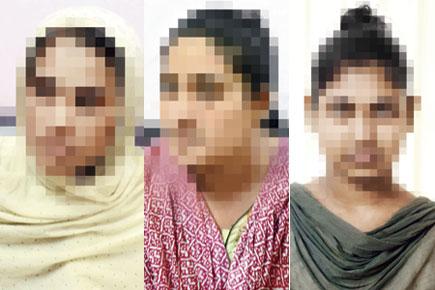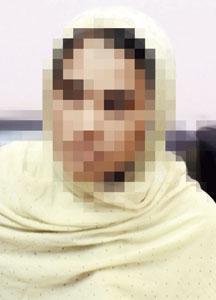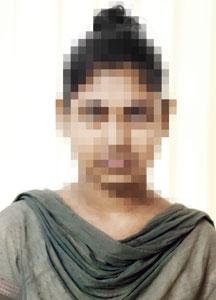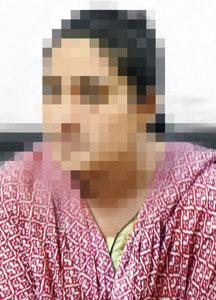The girls, now being taken care of in various shelter homes in Mumbai, have been here for years; the Bangladesh High Commission office in Mumbai says further repatriation process takes time

For the last 15 months, Neeta (all names changed to protect identity) has been eagerly waiting to go back home — to Dhaka, in her motherland Bangladesh.
ADVERTISEMENT



Neeta, Durang and Sanjana
Her eyes scan every person who approaches her, in hope that someone might bring good tidings, might take her home. Neeta is one of the hundreds of Bangladeshi girls rescued from the brothels in the city.
The 22-year-old was rescued by Rescue Foundation, an NGO, from a brothel in Grant Road. “Do you know when I will be able to go home?” is the first question she poses to us, when we went to meet her at the NGO’s Kandivli shelter.
I am not bothered about anyone else. I have a six-year-old son back in my home country. He must be feeling orphaned right now. My husband died six years ago in a car accident, and since then, I have been raising my child.
My husband had transferred some ancestral property in my son’s name in his will, and he is now under serious threats – people have tried to murder him twice. I pray every day for his safety,” she says with a quiver in her voice that betrays a mother’s fears.
Neeta used to work in a garment factory in her home country (Bangladesh’s readymade garment industry is the second only to China as the world’s largest apparel exporter). One fine day, her cousin presented her with an offer to go to Mumbai in a job that would give her double of what she was earning.
“I had to take care of my paralysed brother and father who has respiratory problems. The offer was irresistible; I needed the money to run the house. I had never imagined my own sister would do this to me. Before I realised it, she sold me to a brothel at Grant Road. I was forced to sleep with men against my wishes.
If I protested, they tortured and starved me for several days. One day, I met a customer who helped me get in touch with the NGO and finally, I was rescued,” she recalled.
She is not the only one. Durang, another garment factory labourer, turned eighteen this year. She was pushed into the brothels of Rajasthan at the tender age of 16. She had sneaked into the country with a co-worker who had promised her a job in Mumbai and ended up in a brothel, from Rajasthan to the red light area of Grant Road here.
“My mother calls me up every week, wanting to know when I will return. She doesn’t know I was in a brothel. I have told her that the police arrested me for some visa issues. My family has been waiting since then,” she says.
Durang has been staying at the shelter for more than two years. She has been stuck in the country for more than three years now. “For one-and-a-half years, I was in a brothel. The remaining time, I have been here (Rescue Foundation),” she explains.
Sold for Rs 1,000
Her friend at the centre, 25-year-old Sanjana, has been there for more than a year. After her husband divorced her for not being able to bear a child, she came to Mumbai looking of a job.
The search ended with her being traded for a mere thousand rupees. Police raided her brothel one day, and this offered her an escape from her hell. The NGO brought her to the Kandivli centre.
“My parents have been suffering because of me. I came here against their wishes. If they come to know that I have been arrested in such a case, they will commit suicide even before I reach home,” she states.
The Rescue Foundation shelter houses 149 Bangladeshi women rescued from red light areas who are awaiting the day they will be repatriated to Bangladesh. But, as bureaucracy goes, it has been taking a lot of time.
Cause of the delay
These are just three out of hundreds of Bangladeshi women languishing in city shelters and NGOs. Their plight poses serious questions on the repatriation process.
On June 16, UNICEF, Rescue Foundation and the officials of government rescue homes, met to discuss illegal human trafficking in the country during repatriation of the Bangladeshi girls topped the agenda.
“There are clear-cut guidelines that these girls cannot be rehabilitated, since they are not Indian citizens. While they are in the rescue homes, we try and ensure that they learn some innovative things that would keep them busy.
All said and done, whatever we do for them, going back to their country is their priority and why should it not? It is their primary right and their government should work it out on a priority basis,” said an NGO worker on condition of anonymity.
In all there are 172 Bangladeshi nationals awaiting repatriation. Of them, 149 are based in various shelter homes of Rescue Foundation in Pune, Boisar and Kandivli, while the government shelters house 42 such victims.
Apart from these, there are other hundreds of Bangladeshis in Byculla jail, arrested for staying illegally in the country. With the number of girls going skyward, the NGOs demanded a separate embassy for Mumbai, since most of these girls were rescued from the city.
“The Bangladesh High Commission took note of our grievances and a Deputy High Commission’s office was set up at Bandra-Kurla Complex. But work is moving at snail’s pace,” said Triveni Acharya, president of the Rescue Foundation.
The Deputy High Commission, which was set up in Mumbai in 2013, has consular jurisdiction over the states of Maharashtra, Gujarat, Andhra Pradesh, Karnataka, Tamil Nadu, Kerala and Goa and the union territories of Puducherry, and Daman and Diu.
With the opening of the new Deputy High Commission here, Bangladesh have four diplomatic representations in India - New Delhi, Kolkata, Mumbai and a visa office in Agartala.
Justifying their side, an official from Bangladesh’s Deputy High Commission office in Mumbai said, “We have been doing our bit. We agree that repatriation process is slow but the verification of these girls is a time consuming process.”
As per the figures available with the state’s Women and Child Development department, there are thousands of such girls in Maharashtra waiting to go home – but only 55 were sent back in 2013- 14. In 2012-13, the number was 85.
The increasing cases of human trafficking has forced the state government to form a nodal office on the issue – the office keeps a track of girls rescued and reports it to the women and child development department.
Dilip Hiwrale, the deputy commissioner of Women and Child Development department, told mid-day, “We have been reviewing the situation at every interval.
We found out that around 170 Bangladeshis are still awaiting their deportations so far.” He, too, agreed that the slow process of repatriation has increased the number of girls at the rescue homes and NGOs.
 Subscribe today by clicking the link and stay updated with the latest news!" Click here!
Subscribe today by clicking the link and stay updated with the latest news!" Click here!






